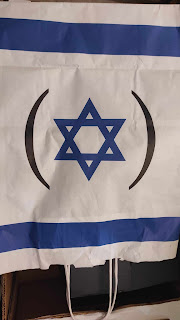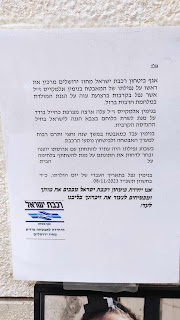
On the "jolly" giant Hannukah dreidels decorating a roundabout in Herzliya Pituah the faces of Israel's still missing hostages replace the traditional Hebrew letters.
In the train stations in Jerusalem and Modiin vast posters displaying with the hostages' names and faces and the legend "Bring the home" cover a wall in the foyers.
In Modiin's central train station there is an empty plastic yellow chair in front of the poster with a sign announcing "this chair will remain empty until they all return home".

Prominently displayed in the middle of the main ticketing halls at train stations are tables with makeshift memorials and the photo of Eliyahu Elmekayes, an Israel Railways security guard killed who was also an army reservist. One of hundreds of thousands of reserve soldiers drafted on emergency call-ups in the wake of the October 7th Hamas invasion, he was killed fighting Hamas in Gaza.
The Hannukah menorahs all over the place can't escape from the shadow of being a country at war.
In malls they stand alongside signs pointing the way to the nearest bomb shelter in case of a rocket siren.
Outside a cafe a glass hannukiah stands in front of a photo of Daniel Kastiel, a soldier in the prestigious Maglan commando killed on the fifth day of the war in Gaza. The photo is flanked by a printed card with the prayer for the IDF and Israel's security forces.

Every other person wears dogtags proclaiming "my heart is captive in Gaza" in support of the hostages and their families. Or a pendant in the shape of a simple map of Israel, maybe with a Magen David star or a heart in its centre, perhaps also a verse for mystical protection like the priestly blessing or the Shema Yisrael prayer. Quite a number of people wear necklaces and bracelets featuring all of the above.
Israeli flags are everywhere, in festive looking stands in the train stations or hung respectfully in shop windows and malls, draped over tall buildings and bus stops, hanging outside homes and businesses, stuck on to walls, vehicles and windows, fluttering from lamposts and balconies, adorning advertisements, billboards and product packages, even on the side panels of train engines.
I walked by a treif (non-kosher) supermarket who's window decor featured Novi God/Christmas trees festooned with copious Israeli flags mixed in with the baubles and tinsel.
.jpg)
Messages of support and encouragement have popped up all over. To Israelis in general, to the soldiers of the IDF, to families of hostages and the bereaved. The giant billboards looming over Tel Aviv's congested city highways that usually advertise fashionable goods now sport blue and white posters to raise morale while hand scrawled notices and pictures drawn by young children are taped to bus shelters, benches, shop windows and blocks of flat. Improvised banners hang on fences, balcony railings and outside shops.
Even the traditional Hannukah holiday sufganiya doughnut treats feature patriotic colours: blue and white frosting and sprinkles or Magen David designs, bakeries selling them in flag decorated boxes with the ubiquitous "together we will win" message which is present everywhere, even more so than the flags or the second most common slogan "Am Yisrael Hai" - the nation of Israel lives.

This is a strange bittersweet Hannukah, streets and transport hubs crowded with soldiers in rumpled, dusty uniforms and guns travelling home for a few hours of precious leave to see their families or schlepping back to the front loaded with homecooked food from home.
.jpeg)
The cheery displays of sufganiyot in the bakery windows are at odds with the faces of the hostages staring out from prominent posters in every public space, the regular roar of military jets overhead punctuated with occasional boom of rockets or distant artillery, the relentless news cycles or the signs everywhere indicating the nearest bomb shelters.
But despite it all this is Hannukah, the festival of light in the darkness, of the miracle of the olive oil, of Jewish hope and defiance in the face of those who seek to wipe us out over and over again.
The word genocide was invented by a Jew because there were no words to describe what happened to the Jewish people during the Holocaust. But for the Jewish people the concept was nothing new. Physically or spiritually and culturally, oppressor after oppressor has tried to perpetrate a genocide of the Jews over and over again throughout the centuries. While they inflicted terrible losses on our people we have always survived. Am Yisrael Hai. We still live and will go on living.
.jpeg)
This year there seem to be even more outdoor Hannukah menorah's lit on streets, in public squares, by the entrances of buildings, balanced on garden walls. And so many twinkle from the windows of homes and offices, on the counters of shops and cafes, perched on balcony railings.
Knowing how many Israelis are still captive, missing or mourning loved ones it feels weird to suddenly find ourselves in the middle of the joyous festival of Hannukah when for so many of us time seems to have stopped on Simhat Torah, October 7th.
Lighting the candles or oil wicks, comemorating the holiday with traditional foods and songs, gatherings of family and friends, the little things in life we always took for granted, suddenly all feel like a strident, defiant, life affirming act in the face of the sadistic enemy who attacked us on October 7th and the far too many in the big wide world who celebrated that murderous assault on Israel and the Jewish people and who continue to deny our right to exist.
As night falls they broadcast the Hannukah miracle loud and clear, the story of the oil which lasted for eight days, a metaphor for the survival of the Jewish people who held out against the odds in times of terror and persecution, holding on long enough for a new generation, fresh oil from the new season, to be born to ensure our light would continue to shine in the world.


.jpeg)
.jpeg)

.jpeg)











.jpg)



























.jpg)

No comments:
Post a Comment